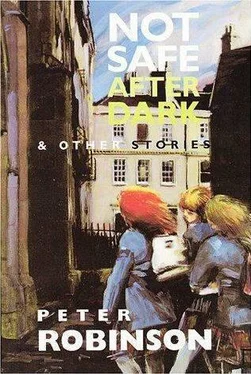It wasn’t too difficult to get around, despite the blackout and the smoke. There were white stripes painted on the lampposts and along the kerbside, and many people had put little dots of luminous paint on their doorbells, so you could tell where you were if you knew the neighbourhood well enough.
I walked along Lansdowne Street to the junction with Cardigan Road. Nobody was abroad. The bombs were distant but getting closer, and the smell from a broken sewage pipe was terrible, despite my handkerchief. Once, I fancied I saw a figure steal out of one of the houses, look this way and that, then disappear into the smoky darkness. I ran, calling out after him, but when I got there he had vanished. It was probably Fingers, I told myself. I’d have a devil of a time catching him now I had scared him off. My best chance was to run him down in one of the back-street cafes where he sold his stolen goods the next day.
So instead of pursuing my futile task, and because it was getting more and more difficult to breathe, I decided that my investigation might next benefit best from a good look around Rose’s empty house.
It was easy enough to gain access via the kitchen window at the back, which wasn’t even latched, and after an undignified and painful fall from the sink to the floor, I managed to regain my equilibrium and set about my business. It occurred to me that if I had such an easy time getting in, then her killer would have had an easy time, too. Rose had been killed with the posser, which would most likely have been placed near the sink or tub in which she did her washing.
Because of the blackout curtains, I didn’t have to worry about my torch giving me away; nor did I have to cover it with tissue paper, as I would outside, so I had plenty of light to see by. I stood for a few moments, adjusting to the room. I could hear fire-engine bells not too far away.
I found little of interest downstairs. Apart from necessities, such as cutlery, pans, plates and dishes, Rose seemed to own nothing. There were no framed photographs on the mantelpiece, no paintings on the drab walls. There wasn’t even a wireless. A search of the sideboard revealed only the rent book that Longbottom had already discovered, a National Identity Card, also in the name of Rose Faversham, her ration book, various coupons, old bills and about twenty pounds in banknotes. I did find two bottles of gin, one almost empty, in the lower half of the china cabinet. There were no letters, no address books, nothing of a personal nature. Rose Faversham’s nest was clean and tidy, but it was also quite sterile.
Wondering whether it was worth bothering, I finally decided to go upstairs to finish my search. The first of the two bedrooms was completely bare. Most people use a spare room to store things they no longer use but can’t bear to throw out just yet; there was nothing like this in Rose’s spare bedroom, just some rather austere wallpaper and bare floorboards.
I felt a tremor of apprehension on entering Rose’s bedroom. After all, she had lived such a private, self-contained life that any encroachment on her most intimate domain seemed a violation. Nonetheless, I went inside.
Apart from the ruffled bedclothes, which I assumed were the result of Detective Sergeant Longbottom’s cursory search, the bedroom was every bit as neat, clean and empty as the rest of the house. The one humanizing detail was a library book on her bedside table: Samuel Butler’s The Way of All Flesh . So Rose Faversham had been an educated woman. Butler’s savage and ironic attack on Victorian values was hardly common bedtime reading on our street.
I looked under the mattress and under the bed, and found nothing. The dressing table held those few items deemed essential for a woman’s appearance and hygiene, and the chest of drawers revealed only stacks of carefully folded undergarments, corsets and the like, among which I had no desire to go probing. The long dresses hung in the wardrobe beside the high-buttoned blouses.
About to give up and head home to bed, I tried one last place – the top of the wardrobe, where I used to keep my secret diaries when I was a boy – and there I found the shoebox. Even a brief glance inside told me it was the repository of whatever past and personal memories Rose Faversham might have wanted to hang on to. Instead of sitting on the bedspread to read by torchlight, I went back downstairs and slipped out of the house like a thief in the night, which I suppose I was, with Rose’s shoebox under my arm. A bomb exploded about half a mile away as I sidled down the street.
•
I should have gone to one of the shelters, I know, but I was feeling devil-may-care that night, and I certainly didn’t want anyone to know I had broken into Rose’s house and stolen her only private possessions. Back in my own humble abode, I made sure my curtains were shut tight, poured a large tumbler of brandy – perhaps, apart from nosiness and an inability to suffer fools gladly, my only vice – then turned on the standard lamp beside my armchair and settled down to examine my haul. There was a certain excitement in having pilfered it, as they say, and for a moment I imagined I had an inkling of that illicit thrill Fingers Finnegan must get every time he burgles someone’s house. Of course, this was different; I hadn’t broken into Rose’s house for my own benefit, to line my own pockets, but to solve the mystery of her murder.
The first thing the shoebox yielded was a photograph of three smiling young women standing in front of an old van with a cross on its side. I could tell by their uniforms that they were nurses from the First World War. On the back, in slightly smudged ink, someone had written ‘Midge, Rose and Margaret – Flanders, 30 July 1917. Friends Inseparable For Ever!’
I stared hard at the photograph and, though my imagination may have been playing tricks on me, I thought I recognized Rose as the one in the middle. She had perfect dimples at the edges of her smile, and her eyes gazed, pure and clear, directly into the lens. She bore little resemblance to the Rose I had known as Mad Maggie, or indeed to the body of Rose Faversham as I had seen it. But I think it was her.
I put the photograph aside and pulled out the next item. It was a book of poetry: Severn and Somme by Ivor Gurney. One of my favourite poets, Gurney was gassed at St Julien, near Passchendaele, and sent to a war hospital near Edinburgh. I heard he later became mentally disturbed and suicidal, and he died just two or three years ago, after nearly twenty years of suffering. I have always regretted that we never met.
I opened the book. On the title page, someone had written, ‘To My Darling Rose on her 21st Birthday, 20 March 1918. Love, Nicholas.’ So Rose was even younger than I had thought.
I set the book aside for a moment and rubbed my eyes. Sometimes I fancied the residual effects of the gas made them water, though my doctor assured me that it was a foolish notion, as mustard gas wasn’t a lachrymator.
I hadn’t been in the war as late as March 1918. The injury that sent me to a hospital in Manchester, my ‘Blighty’, took place the year before. Blistered and blinded, I had lain in bed there for months, unwilling to get up. The blindness passed, but the scarring remained, both inside and out. In the small hours, when I can’t sleep, I relive those early days of August 1917 in Flanders: the driving rain, the mud, the lice, the rats, the deafening explosions. It was madness. We were doomed from the start by incompetent leaders, and as we struggled waist deep through mud, with shells and bullets flying all around us, we could only watch in hopeless acceptance as our own artillery sank in the mud, and our tanks followed it down.
Judging by the words on the back of the photograph, Rose had been there, too: Rose , one of the angels of mercy who tended the wounded and the dying in the trenches of Flanders’ fields.
Читать дальше










![Джеймс Чейз - Not Safe to Be Free [= The Case of the Strangled Starlet]](/books/417649/dzhejms-chejz-not-safe-to-be-free-the-case-of-the-thumb.webp)

